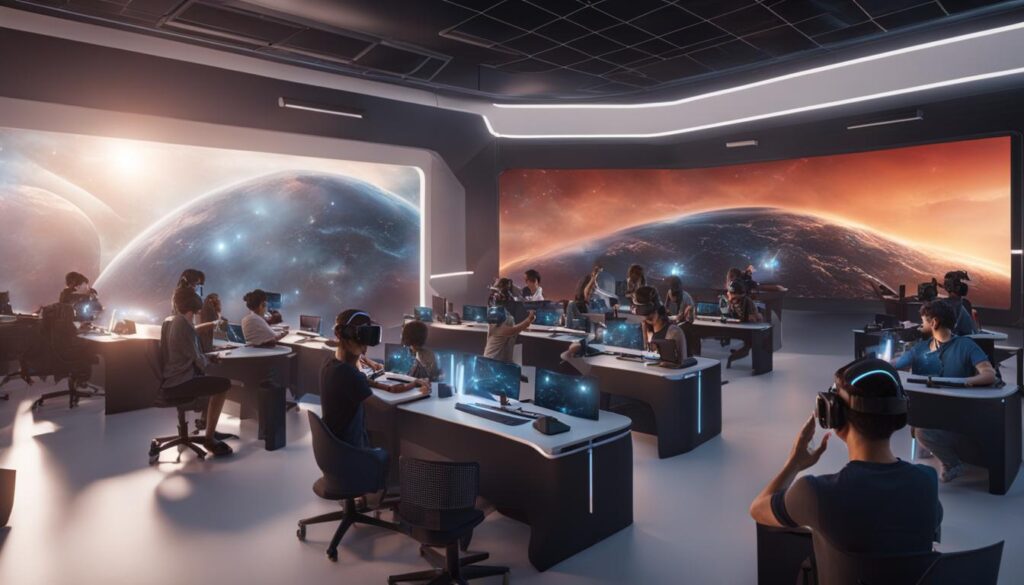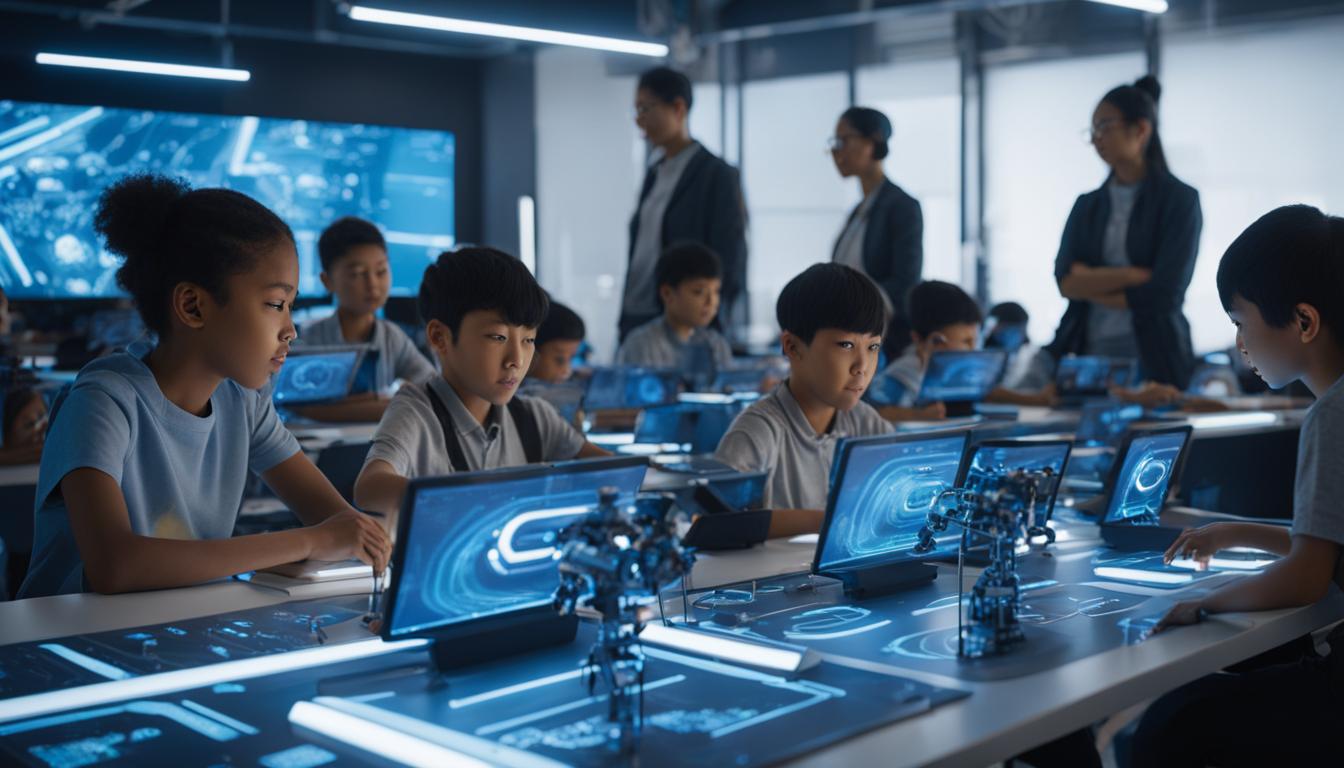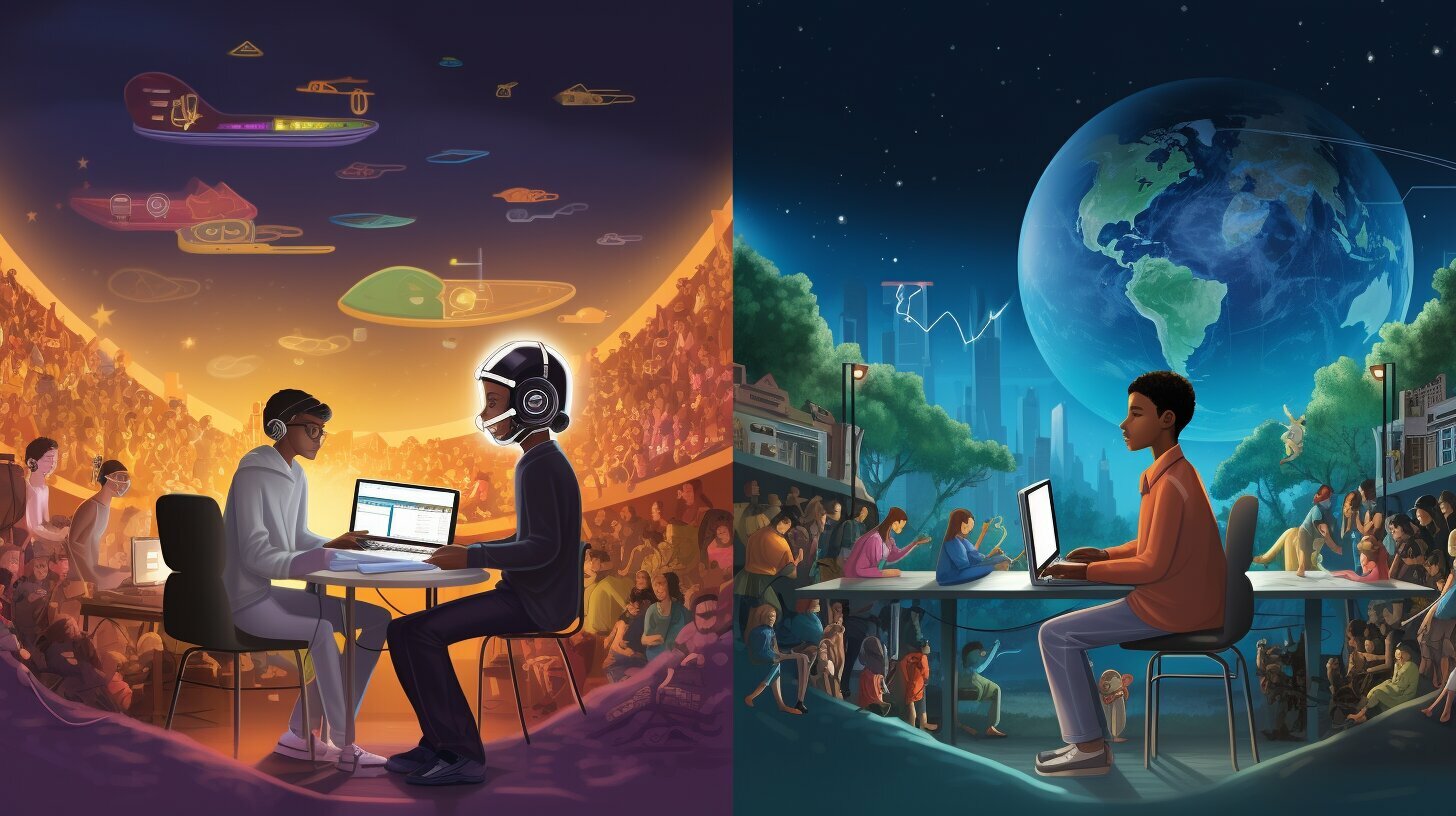Welcome to our article on the thrilling realm of online AI studies and the future of education! With the continuous advancement of technology, the field of online learning also continues to progress. Artificial intelligence (AI) is at the forefront of major developments in online education, providing customized learning experiences for students and revolutionizing the teaching methods of instructors.
AI studies online encompass a range of topics, including artificial intelligence courses, machine learning, deep learning, and data science. These studies empower learners to understand the intricacies of AI and its applications in various industries. By exploring AI studies online, you can stay ahead of the curve and gain valuable insights into the future of education.
Key Takeaways
- AI studies online provide opportunities to explore artificial intelligence and its impact on education.
- Online learning with AI offers personalized experiences and adaptive assessments for students.
- AI and VR technology are revolutionizing the way we learn, bridging the skills gap, and preparing us for the future workforce.
- It is crucial to address ethical considerations and ensure equitable access to AI and VR technology in education.
- Human interaction remains essential in education, even as AI advancements continue to enhance the learning experience.
The Benefits of AI in Education
In the field of online education, artificial intelligence (AI) technology offers numerous benefits that enhance the learning experience for students and streamline tasks for instructors. By personalizing learning, providing adaptive assessments, and powering online education, AI is transforming the way we approach education.
Personalized learning is a key advantage of AI in education. Through the analysis of student data such as grades and learning patterns, AI systems can tailor content and delivery methods to meet the individual needs of each student. This personalized approach allows students to learn at their own pace and in a way that suits their unique learning style.
Another benefit of AI in education is adaptive assessments. Traditionally, assessments have been one-size-fits-all, but with AI, assessments can now be tailored to the individual student. By analyzing student responses and performance, AI systems can identify areas where students may be struggling and provide targeted support to help them succeed.
| Benefits of AI in Education | Summary |
|---|---|
| Personalized Learning | AI analyzes student data to tailor content and delivery methods. |
| Adaptive Assessments | AI systems provide targeted support based on individual student performance. |
| Streamlined Tasks | AI automates routine tasks like grading, allowing instructors to focus on mentorship. |
The Benefits of AI in Education
- Personalized learning – AI tailors content and delivery methods to meet individual student needs.
- Adaptive assessments – AI provides targeted support based on individual student performance.
- Streamlined tasks – AI automates routine tasks like grading, allowing instructors to focus on mentorship.
“AI in education enables personalized learning experiences and adaptive assessments, revolutionizing the way students learn and instructors teach.”
Furthermore, AI technology also streamlines tasks for instructors by automating routine tasks such as grading and providing feedback. This frees up valuable time for instructors to focus on mentorship and building meaningful relationships with their students.
In conclusion, AI in education has the potential to revolutionize the learning experience by personalizing learning, providing adaptive assessments, and streamlining tasks for instructors. As technology continues to advance, we can expect AI to play an even larger role in shaping the future of education.
The Benefits of AI in Education
A summary of the benefits of AI in education are:
- Personalized learning – AI tailors content and delivery methods to meet individual student needs.
- Adaptive assessments – AI provides targeted support based on individual student performance.
- Streamlined tasks – AI automates routine tasks like grading, allowing instructors to focus on mentorship.
Immersive Learning Experiences with VR Technology
Virtual Reality (VR) technology is revolutionizing the way we learn by providing immersive and interactive simulations. It allows students to engage in hands-on learning experiences that go beyond traditional classroom settings. With VR, students can explore complex concepts in a simulated environment, enhancing their understanding and retention of information.
One of the key benefits of VR technology in education is its ability to break down barriers of time and space. Through VR, students can virtually visit historical events, conduct scientific experiments, and interact with intricate machinery. This level of interactivity and realism creates a more engaging and memorable learning experience, enabling students to grasp concepts in a way that textbooks and lectures cannot provide.
Furthermore, VR technology allows for personalized and adaptive learning experiences. It can adapt content and difficulty levels based on individual student needs, ensuring that each student is challenged at the appropriate level. VR can also provide real-time feedback and assessments, allowing students to track their progress and identify areas for improvement. This personalized approach to learning promotes student engagement and motivation, leading to better learning outcomes.
| Benefits of VR Technology in Education | |
|---|---|
| Hands-on learning | VR allows students to engage in interactive simulations, gaining practical experience and enhancing their understanding of complex concepts. |
| Immersive experiences | Through VR, students can explore virtual environments that would otherwise be inaccessible, creating a more engaging and memorable learning experience. |
| Personalized learning | VR technology can adapt content and difficulty levels based on individual student needs, providing a tailored learning experience. |
| Real-time feedback | VR can provide immediate feedback and assessments, allowing students to track their progress and make improvements. |
In conclusion, VR technology opens up new possibilities for immersive and personalized learning experiences. It allows students to engage in hands-on activities, explore virtual environments, and receive real-time feedback. By incorporating VR into education, we can create a more dynamic and effective learning environment that caters to the individual needs of students.
Bridging the Skills Gap with AI and VR
In today’s rapidly changing world, it is crucial for students to acquire the skills needed to succeed in the future workforce. The combination of Artificial Intelligence (AI) and Virtual Reality (VR) technology presents a unique opportunity to bridge the skills gap and provide students with real-world experience and valuable skills development.
With AI and VR, students can engage in virtual apprenticeships and internships, gaining hands-on experience in a simulated environment. This allows them to develop practical skills and apply them to real-world scenarios, preparing them for the demands of the future workplace. Whether it’s through interactive simulations or immersive learning experiences, AI and VR provide students with an opportunity to learn in a dynamic and engaging manner.
To better illustrate the impact of AI and VR on skills development, let’s take a look at the following table:
| Skills Development | AI | VR |
|---|---|---|
| Real-world experience | Virtual apprenticeships and internships provide practical experience in a simulated environment. | Hands-on learning through interactive simulations offers students the opportunity to apply knowledge in a realistic setting. |
| Collaboration | AI-powered collaboration tools facilitate teamwork and communication among students, preparing them for collaborative work environments. | VR enables students to collaborate and solve problems together in immersive virtual environments, fostering teamwork and critical thinking skills. |
| Adaptability | AI-powered adaptive learning platforms personalize education to individual student needs, helping them develop adaptive thinking skills. | VR allows students to explore different scenarios and environments, promoting adaptability and the ability to navigate complex situations. |
As we can see from the table, both AI and VR offer unique benefits when it comes to skills development. By combining these technologies, students can gain real-world experience, collaborate with their peers, and develop adaptability skills that are essential for success in the future workplace.
Summary
- AI and VR technology provide opportunities for skills development and real-world experience.
- Virtual apprenticeships and internships in a simulated environment help bridge the skills gap.
- Interactive simulations and immersive learning experiences in VR enhance hands-on learning.
- AI-powered collaboration tools and adaptive learning platforms foster collaboration and adaptability.

Ensuring Ethical and Equitable Implementation of AI and VR in Education
As we continue to embrace the integration of AI and VR technology in education, it is crucial to address the ethical and equitable implications that come along with it. Privacy concerns are a significant consideration when implementing these technologies. With AI’s ability to analyze vast amounts of data, it’s important to establish strict guidelines to protect students’ personal information. We must ensure that data is collected and stored securely and that consent is obtained from students and their parents or guardians.
Moreover, ethical considerations arise when using AI and VR in education. We must be mindful of algorithmic bias, which could potentially perpetuate inequalities or reinforce existing biases. Transparent and accountable algorithms are essential to prevent discrimination and ensure equal opportunities for all students. It is our responsibility to develop and utilize AI systems that are fair and unbiased, promoting inclusivity and diversity.
Another crucial aspect to consider is equal access to AI and VR technology. While these technologies offer promising educational opportunities, it is essential to bridge the digital divide. Students from underserved communities should have the same access to AI and VR tools as their counterparts in more affluent areas. Closing the equity gap requires concerted efforts to provide adequate resources and training to schools and educators in underserved communities.
| Challenges | Solutions |
|---|---|
| Privacy concerns | Establish strict data protection guidelines and obtain consent from students and parents. |
| Ethical implications | Develop transparent and accountable algorithms to prevent bias and discrimination. |
| Equal access | Close the digital divide by providing resources and training to underserved communities. |
By addressing these privacy concerns, ethical implications, and ensuring equal access to AI and VR technology, we can create an educational environment that promotes fairness, inclusivity, and student success. It is our duty to harness the potential of these technologies while safeguarding the rights and well-being of students. Together, we can build a future where AI and VR enhance education in an ethical and equitable manner.
Challenges and Considerations of AI and VR Integration in Education
As exciting as the integration of AI and VR technology in education may be, it is not without its challenges. One major obstacle is the high cost associated with implementing these technologies in educational institutions. The upfront investment in hardware, software, and infrastructure can be substantial, making it difficult for some schools to afford these advancements. Additionally, ongoing maintenance and training costs must be factored in, as technology is constantly evolving and staff needs to be up-to-date with the latest developments.
Privacy concerns also pose a significant challenge when it comes to AI and VR integration in education. These technologies often involve collecting and analyzing large amounts of student data, raising important questions about data security and privacy protection. Educational institutions must ensure that strict protocols and safeguards are in place to protect the privacy and confidentiality of student information.
Another challenge is the lack of trained personnel who can effectively implement and utilize AI and VR technology in the educational setting. While these technologies offer promising opportunities, there is a shortage of educators and IT professionals with the necessary skills and expertise to fully leverage their potential. Efforts should be made to provide training and professional development opportunities to educators, ensuring they have the knowledge and abilities to make the most of AI and VR in the classroom.

Table: Comparison of Integration Challenges
| Integration Challenge | Description |
|---|---|
| High Cost | The upfront and ongoing expenses associated with implementing AI and VR technology in education. |
| Privacy Concerns | The need to protect student data and ensure data security and privacy. |
| Lack of Trained Personnel | The shortage of educators and IT professionals with the skills to effectively utilize AI and VR technology in the classroom. |
Addressing these challenges is crucial to ensure the effective and responsible use of AI and VR in education. A collaborative effort between educational institutions, technology providers, and policymakers is needed to overcome these obstacles. By finding innovative solutions and investing in the necessary resources, we can create a future where AI and VR technology enhance the learning experience and prepare students for the evolving workforce.
AI and VR’s Impact on the Future of Work
The rapid advancements in AI and VR technologies are reshaping the future of work and transforming various industries. These technologies have the potential to automate routine tasks, create new job roles, and completely change the dynamics of the human-AI relationship in the workplace.
One of the main impacts of AI and VR on the future of work is the shifting roles and responsibilities of employees. With the automation capabilities of AI, many repetitive and mundane tasks can now be performed by machines. This allows employees to focus on more complex and creative aspects of their jobs, leading to enhanced productivity and job satisfaction.
Furthermore, AI and VR technologies are enabling the creation of entirely new job roles that were previously unimaginable. For example, AI is driving the development of roles like data scientists and machine learning engineers, while VR is opening up opportunities in fields such as virtual reality design and programming.
“AI and VR technologies are revolutionizing the way we work, providing us with unprecedented opportunities for growth and innovation. It is essential for individuals to adapt to these changes by acquiring new skills and embracing the collaboration between humans and intelligent machines.”
The human-AI relationship is also evolving as these technologies become more integrated into the workplace. Rather than replacing humans, AI is augmenting human capabilities and enabling collaboration between humans and intelligent machines. This partnership allows for increased efficiency, accuracy, and decision-making capabilities, resulting in better business outcomes.
| Impact | Description |
|---|---|
| Automation of routine tasks | AI can handle repetitive tasks, freeing up employees to focus on more complex and creative work. |
| Creation of new job roles | AI and VR are driving the development of new roles that were previously unimaginable. |
| Collaboration between humans and AI | AI technologies are augmenting human capabilities and enabling more efficient and accurate decision-making. |
To thrive in the future workplace, individuals need to embrace the potential of AI and VR technologies. This involves acquiring new skills, adapting to changing roles, and developing a mindset that embraces collaboration with intelligent machines. By doing so, we can harness the full power of these technologies and shape a future where humans and AI work together to drive innovation and growth.
Adapting Skills for the Future Workplace
Rapid advancements in technology, particularly in artificial intelligence and virtual reality, are reshaping the landscape of the future workplace. To thrive in this ever-evolving environment, individuals must proactively adapt their skill sets to meet the demands of emerging technological roles. Upskilling and continuous learning are essential for career development and remaining competitive in the job market.
Technological roles, such as data scientists, machine learning engineers, and virtual reality developers, are in high demand as organizations seek professionals with expertise in these areas. To transition into these roles, individuals should focus on acquiring the necessary technical skills, such as coding, data analysis, and programming languages relevant to AI and VR technologies. Additionally, having a solid understanding of the principles underlying AI and VR is crucial to effectively leverage these technologies in a professional setting.
“Upskilling and continuous learning are essential for career development and remaining competitive in the job market.”
Continuous Learning and Professional Development
Continuous learning is a key aspect of adapting skills for the future workplace. It involves staying updated with the latest advancements in AI and VR, as well as other relevant technologies. Online courses, certifications, and workshops can provide valuable learning opportunities and help individuals acquire the skills needed for emerging job roles. Additionally, participating in industry conferences and networking events can foster connections with professionals in the field, opening doors to new career opportunities.
Moreover, developing strong communication, critical thinking, and problem-solving skills is vital for success in technological roles. These skills allow individuals to effectively collaborate with multidisciplinary teams, analyze complex data, and find innovative solutions to challenges that arise in AI and VR projects.
In conclusion, adapting skills for the future workplace involves continuous learning, upskilling, and staying abreast of technological advancements. By acquiring the necessary technical skills and developing strong communication and problem-solving abilities, individuals can position themselves for success in technological roles. Embracing and harnessing the power of AI and VR will be instrumental in shaping the future of work, and those who adapt their skill sets accordingly will thrive in this dynamic environment.
The Future of AI in Education
As AI technology continues to advance, its role in education is increasingly prominent. AI brings forth numerous advancements that have the potential to revolutionize learning environments and enhance educational experiences. With personalized learning, adaptive assessments, and immersive learning experiences, AI is transforming the way we approach education.
One of the key areas where AI is making a significant impact is in personalized learning. By analyzing student data and learning patterns, AI systems can adapt content and delivery methods to meet the individual needs of students. This tailored approach helps students grasp concepts more effectively and allows educators to provide targeted support.
Another valuable application of AI in education is the use of adaptive assessments. These assessments utilize AI algorithms to evaluate student performance and provide feedback in real-time. By identifying areas where students are struggling and offering personalized guidance, adaptive assessments help students improve their learning outcomes.
AI brings forth numerous advancements that have the potential to revolutionize learning environments and enhance educational experiences.
Furthermore, AI technology enables immersive learning experiences through virtual reality (VR) simulations. VR technology allows students to explore complex concepts in a hands-on and interactive manner. From historical events to scientific experiments, VR simulations create engaging and memorable learning experiences that transcend traditional limitations of time and space.
While AI advancements in education offer immense potential, it is crucial to maintain a balance between AI and human interaction. Although AI enhances the learning experience, the role of human teachers remains irreplaceable. Effective education requires the unique qualities that human instructors bring, such as empathy, guidance, and personal connection.
| Advantages of AI in Education | Challenges of AI in Education |
|---|---|
|
|
As AI continues to evolve and shape the future of education, it is essential to embrace its advancements while also addressing the challenges it presents. By combining the power of AI with the unique qualities of human instructors, we can create truly transformative learning environments that empower students and prepare them for the ever-changing world.
Conclusion
AI studies online provide us with a glimpse into the future of education. By integrating AI and VR technology, we have the potential to revolutionize learning experiences, bridge the skills gap, and prepare students for the workforce of tomorrow. However, as we embrace these advancements, we must also address ethical considerations and ensure equitable access to technology.
While AI systems enhance personalized learning and adaptive assessments, we must remember the importance of human interaction in education. Human teachers play a crucial role in fostering meaningful connections and providing mentorship to students. As AI technology continues to advance, we must find the balance between AI-driven personalization and the invaluable guidance of human educators.
The future of education holds exciting possibilities as AI continues to evolve. Through online learning, we can explore the potential of AI in personalized instruction, adaptive assessments, and immersive learning experiences. As we adapt our skills and embrace AI advancements, we position ourselves for success in the ever-evolving learning environments of the future.
FAQ
How can AI enhance personalized learning?
AI analyzes student data to adapt content and delivery methods to individual needs, providing personalized learning experiences.
What tasks can AI automate for instructors?
AI can automate tasks like grading and feedback, allowing instructors to focus on mentorship and relationship-building with students.
How can VR enhance learning experiences?
VR technology allows students to explore and interact with complex concepts in a hands-on way, creating more engaging and memorable learning experiences.
How can AI and VR bridge the skills gap?
AI and VR can create virtual apprenticeships and internships, allowing students to gain real-world experience and develop valuable skills in a simulated environment.
What challenges are associated with the integration of AI and VR in education?
Challenges include high costs, privacy and security concerns, and the need for trained personnel.
What ethical considerations are there for AI and VR in education?
Ethical considerations include algorithmic bias, responsible use of technology, and ensuring equitable access for all students.
How can individuals adapt their skills for the future workplace?
Individuals need to continually upskill and stay updated with technological advancements to thrive in the evolving workplace.
What is the future role of AI in education?
AI will play a larger role in personalized learning, adaptive assessments, and immersive learning experiences, but human teachers and interaction remain crucial.
What are the benefits of AI studies online?
AI studies online offer the potential for personalized learning, adaptive assessments, and preparation for the future of work.










